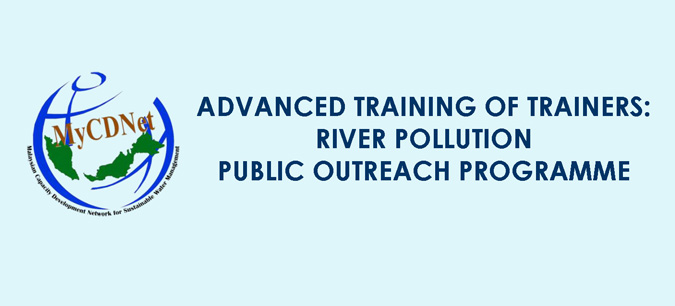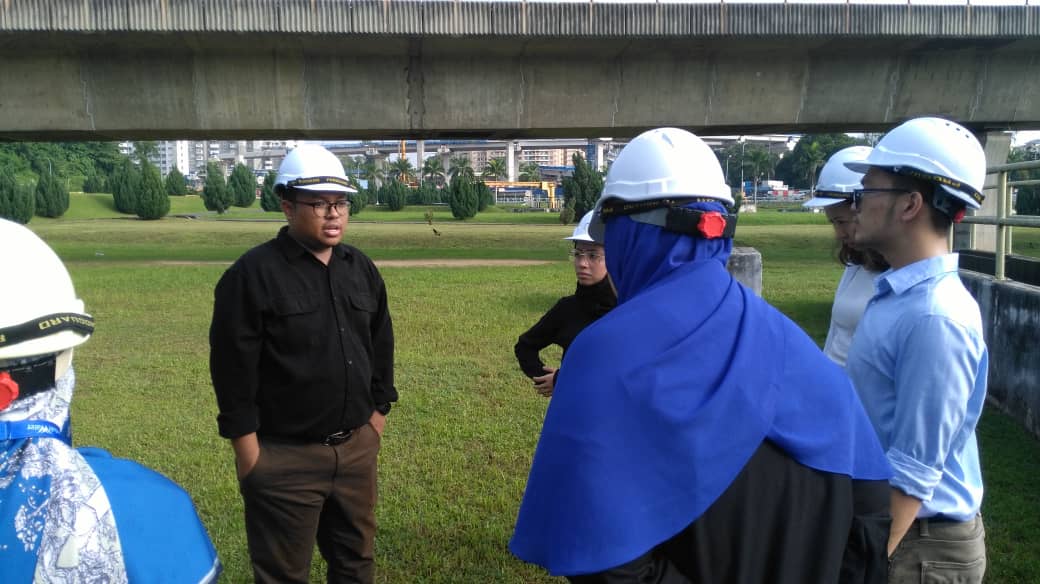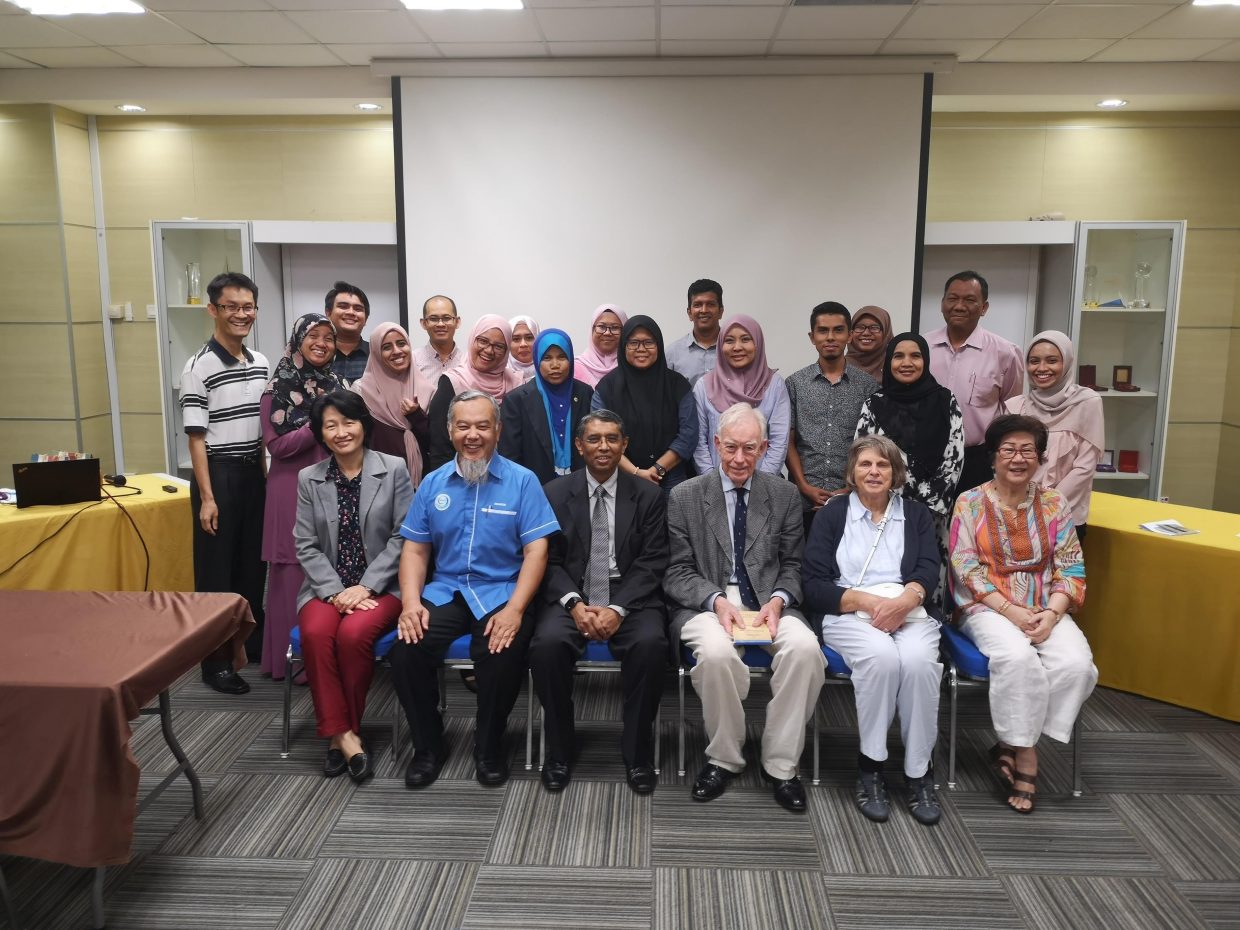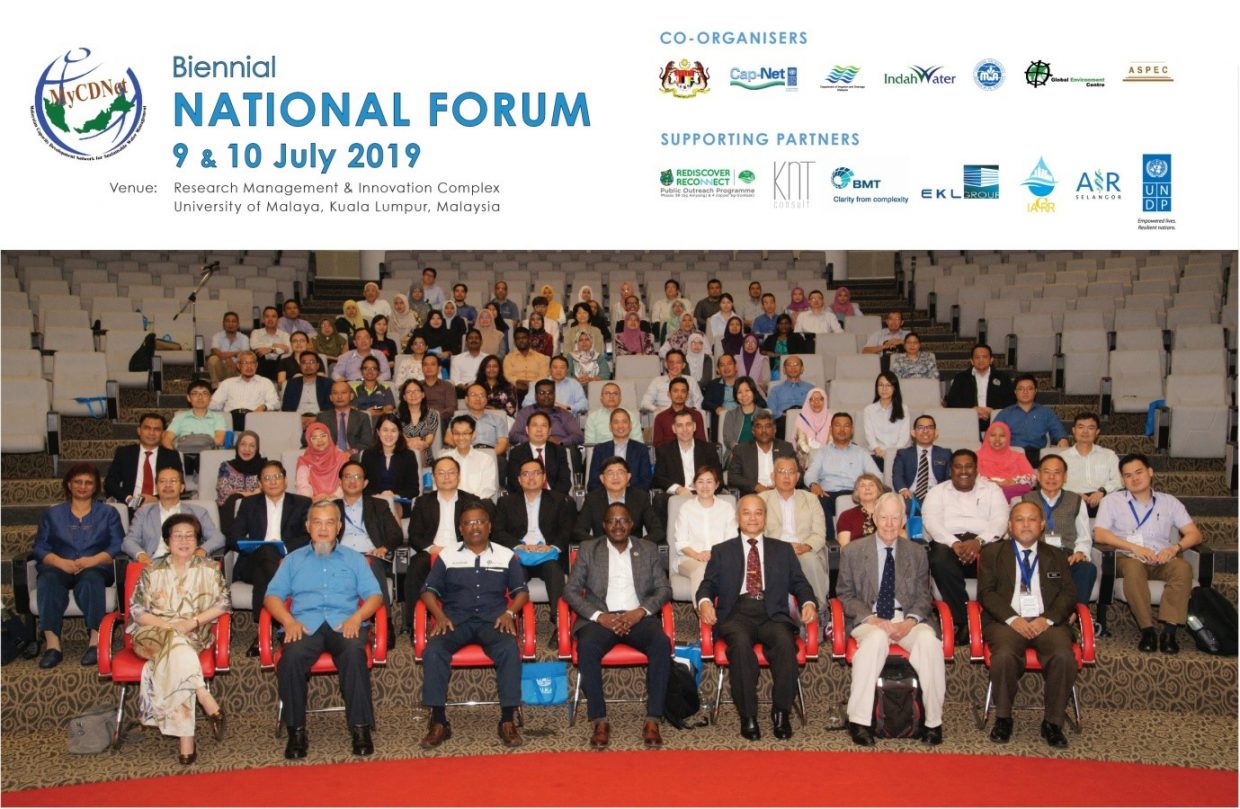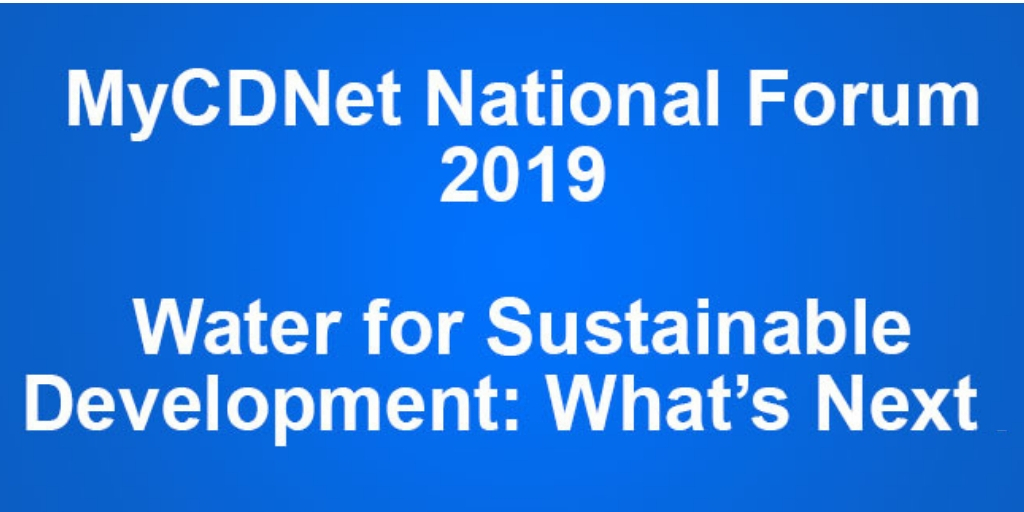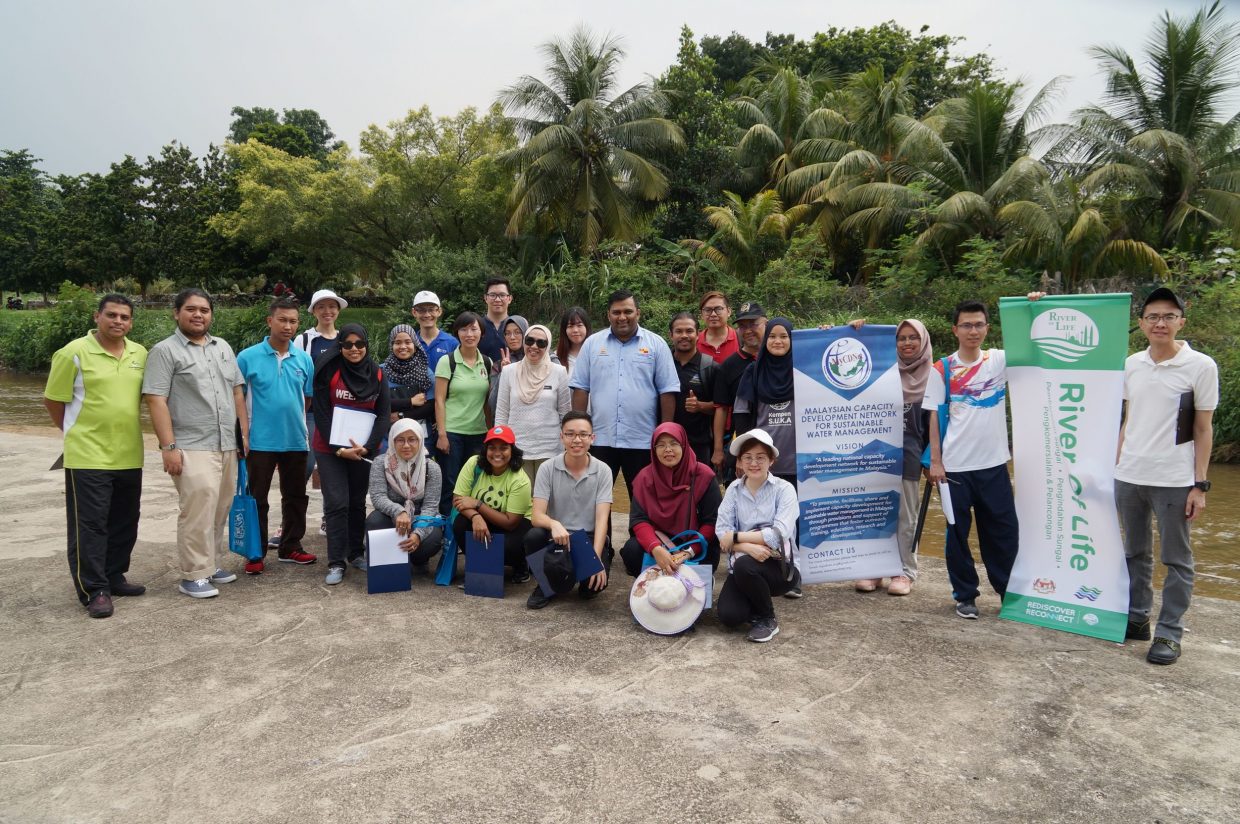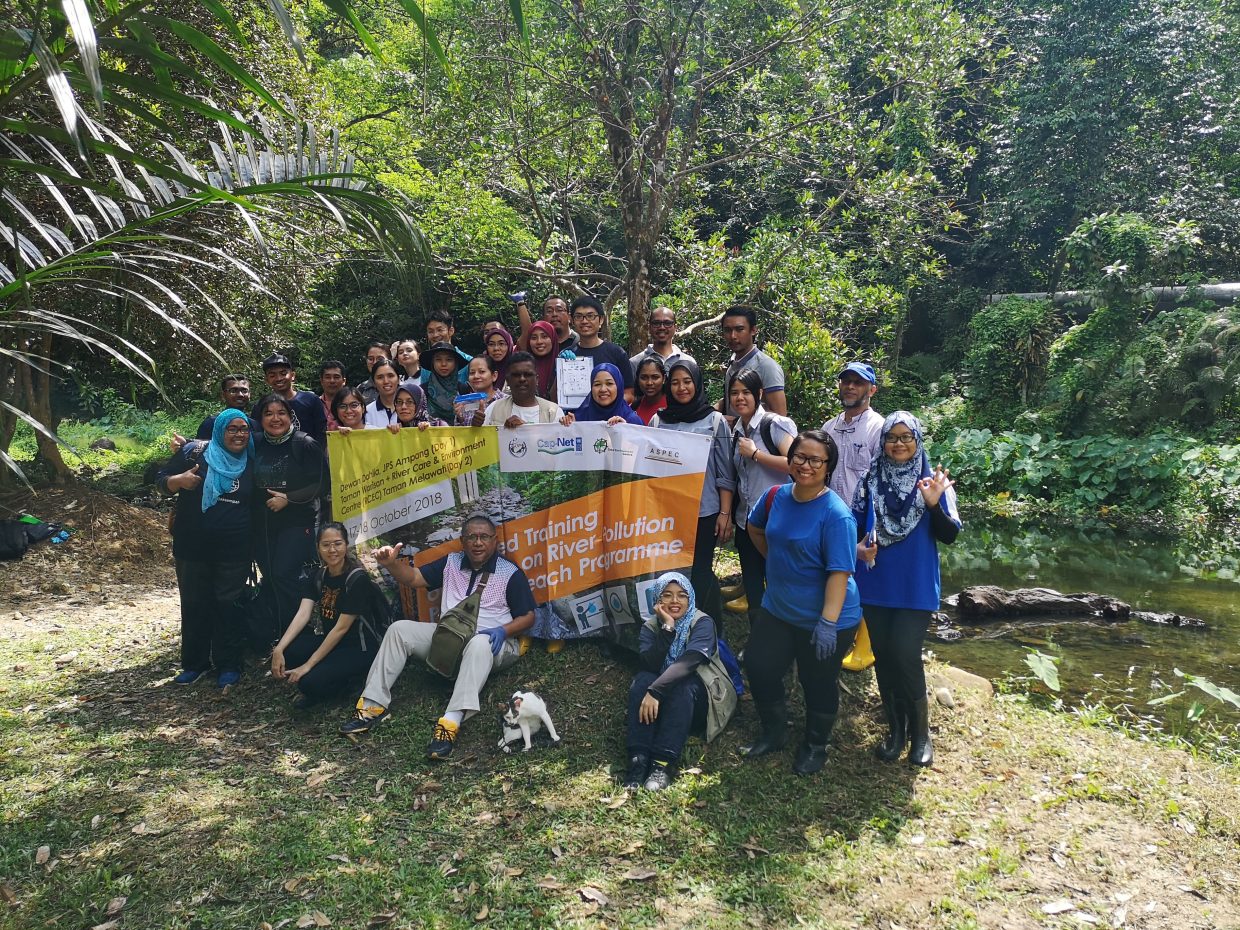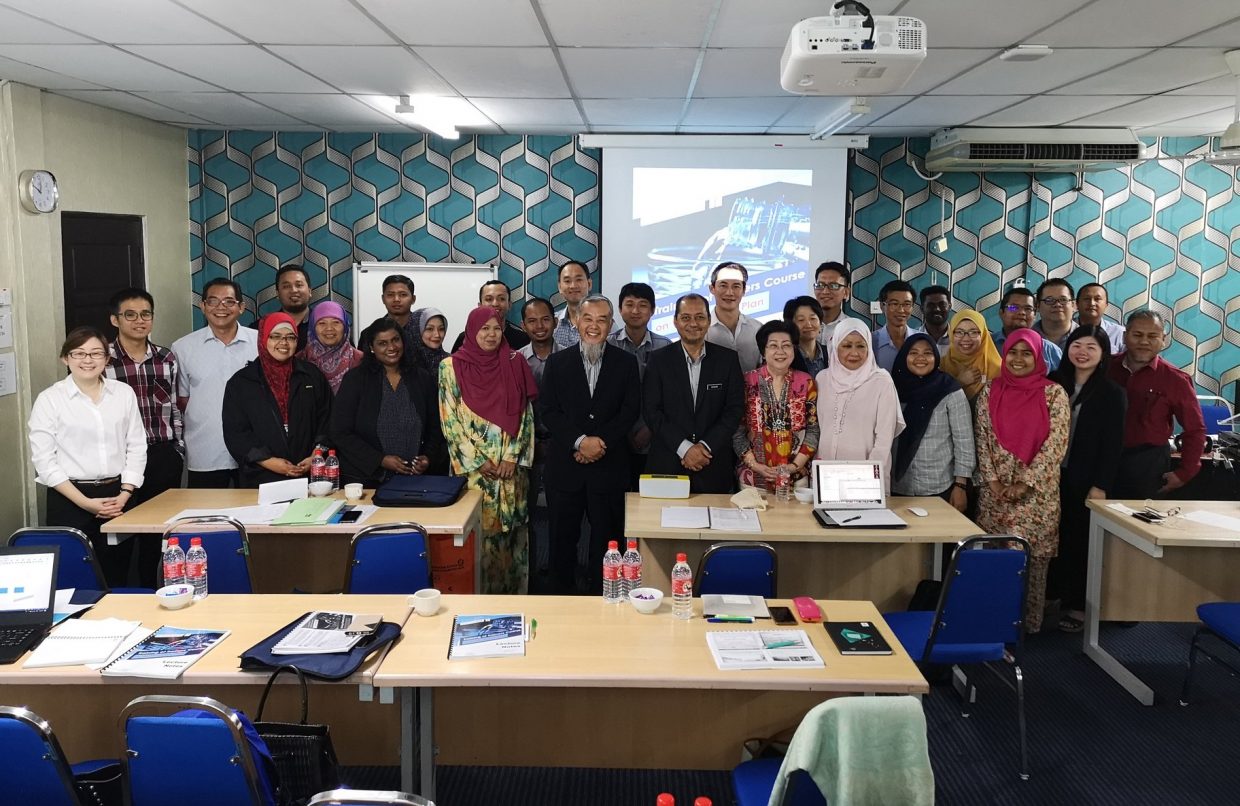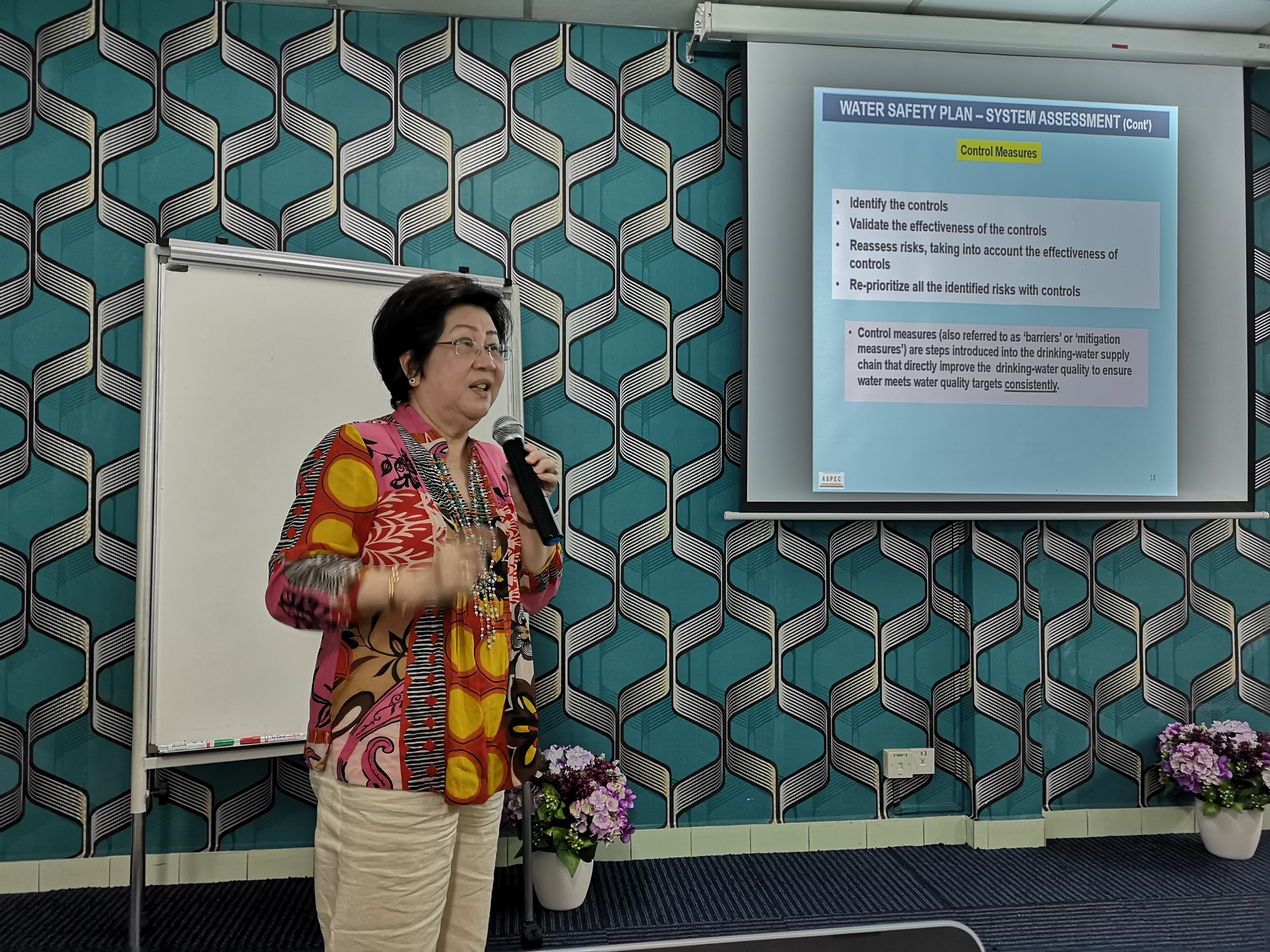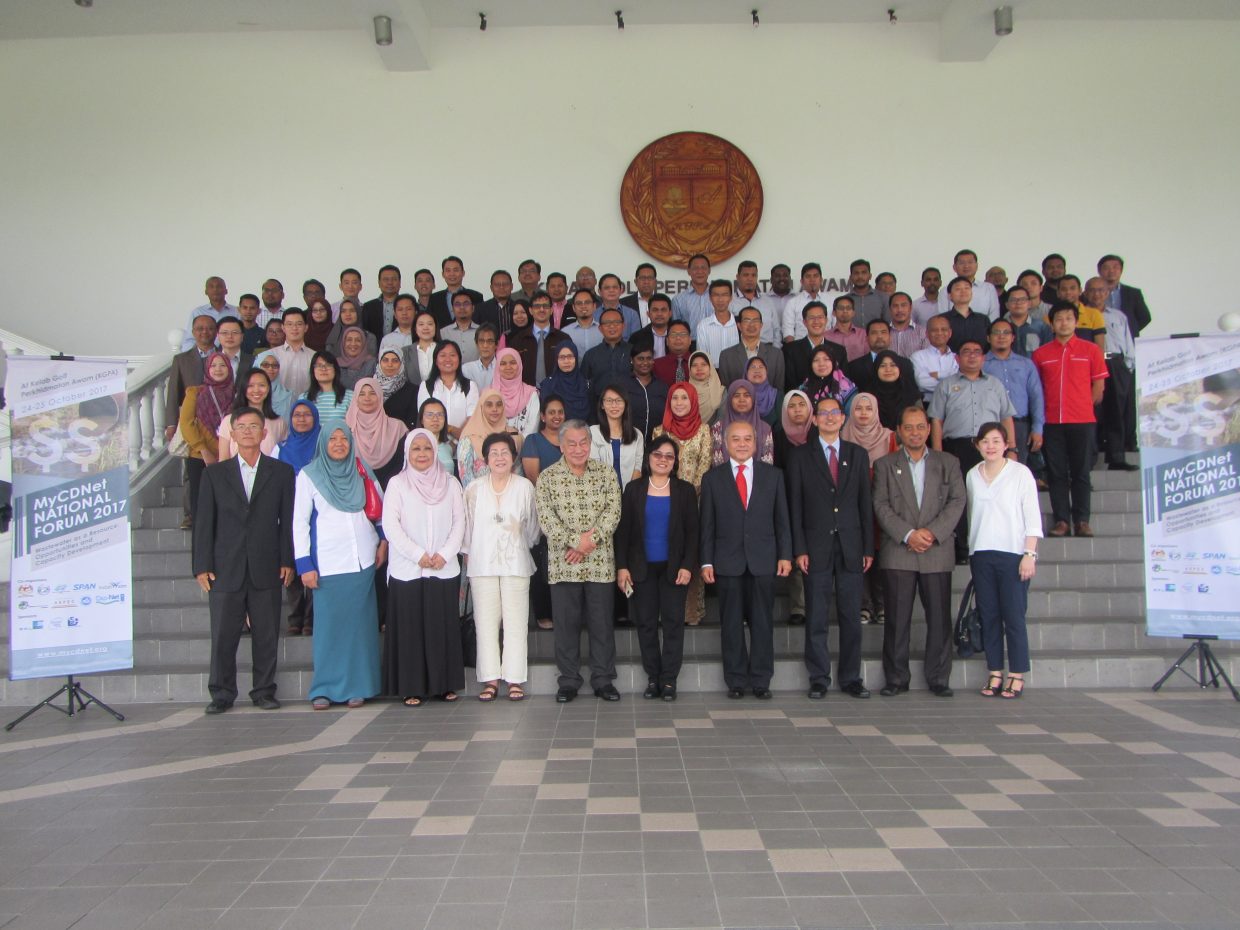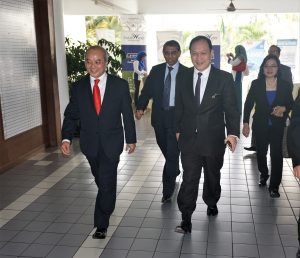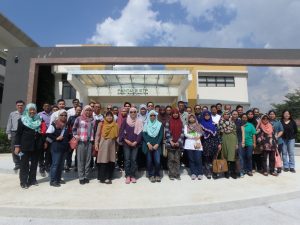Advanced TOT on River Pollution Public Outreach Programme
Dear esteemed Members,
We hope that everyone is safe and well.
Moving forward in the new normal, Malaysian Capacity Development Network on Sustainable Water Management (MyCDNet) strives to continue to link and capacity build water-related stakeholders in Malaysia. We are pleased to invite you and your friends to the Advanced TOT on River Pollution Public Outreach Programme – a hybrid of online webinar and site visit.
Day 1, 5 August 2020, 9.30am-1.00pm – Webinar on Zoom
Day 2, 6 August 2020, 8.30am-1.00pm – Outdoor Classroom (Limited to 20 participants only. First come, first served)
Please find details in the flyer attached below and register before 26 July 2020 on https://forms.gle/aszGXJmmtoQmEUfa8
The Zoom link will be emailed to the registered participants.
E-certificates of participation will be given out.
Looking forward to seeing everyone again virtually and in person.
Best regards,
Alicia
Network Assistant

- Published in Environment, Events, Outreach, Past Events
TOT on Environmental Compliance Obligations for Sewage Treatment Plant Operations and Introduction to Climate Change
The Malaysian Capacity Development Network for Sustainable Water Management (MyCDNet) and Indah Water Konsortium Sdn Bhd (IWK) have organized and conducted the TOT on Environmental Compliance Obligations for Sewage Treatment Plant Operations and Introduction to Climate Change, on 11 – 12 March 2020, held at Indah Water Training Centre in Bukit Jalil, Kuala Lumpur, Malaysia.
This TOT was organised with the objective to provide basic understanding and awareness on the current localised and global environmental issues, with an introduction to good environmental practices within the organisation; to provide latest updates on relevant environmental obligations pertaining to sewage treatment plant’s operations; and to provide the participants with the methodology for periodically evaluating its organisation’s environmental obligations to meet the commitment to compliances and regulations.
The one-and-half-day event was facilitated by experienced trainer Mdm Wani Mastura binti Mohamad, the Manager at the Environmental Management Unit of Indah Water Konsortium Sdn. Bhd. who has extensive experience in planning and leading environmental related projects for the organisation. Her responsibilities include overseeing preparations of Environmental Impact Assessment reports, Environmental Management plans, Post-monitoring reports as well as Hazard and Operability studies (HAZOP). She holds a Master of Science in Civil Engineering (Environmental Engineering) and a Bachelor in Biochemical Engineering. She is also a certified Internal Auditor for QMS ISO9001:2008 and EMS ISO14001:2004, and the internal trainer for Indah Water Konsortium Sdn. Bhd. for topics such as “HAZOP for Sewerage Industry” and “EIA for Sewerage Projects”.
The Network Manager of MyCDNet Dato’ Ir Lim Chow Hock opened the training with welcoming remarks and an introduction of MyCDNet and Cap-Net UNDP. Day 1 was a full day training covering the topics 1) Environmental Issues in Sewage Treatment & Compliance to Environmental Obligations, 2) Good Environmental Practices for Sewerage Industry Professionals, 3) Environmental Obligations and Regulations, and 4) Introduction to Climate Change, Greenhouse Gases Inventory and Reduction Strategy.
On Day 2, the participants visited the Indah Water Konsortium Regional Sewage Treatment Plant (RSTP) KL-Sungai Besi, which has been in operation since 1998 adopting the Modified Oxidation Ditch system to serve the Sungai Besi catchment area as its sewage treatment system. The effluent, which meets the Department of Environment’s strict regulations, is discharged back into the nearby Kuyoh River.
Feedbacks and comments from participants were very positive. The site visit to the sewage treatment plant was educational and interesting as it was a first for most of the participants because special permission is needed to visit sewage treatment plants here. Overall, the training was informative, lively and interactive.
Training slides can be viewed at :-
https://drive.google.com/drive/folders/12deMGXL8u4qpNQleSmRowl91gDtIu3qd?usp=sharing..
..

..
.
…
- Published in Environment, Events, Gallery, Past Events
Part II Training of Trainers on Water Safety Plan
The Malaysian Capacity Development Network for Sustainable Water Management (MyCDNet) has organized and conducted the second part of the series of courses for Water Safety Plan (WSP) on 11 – 12 July 2019, held at the Research Management & Innovation Complex in Universiti Malaya, Kuala Lumpur, Malaysia, for 20 participants who were mainly from water agencies nationwide. The Course was held right on the heels of the 2-day MyCDNet Biennial National Forum 2019 that was successfully completed on 10 July at the same venue.
The Part II TOT Course was carried out in collaboration with Specialists from the Malaysian Water Association (MWA), Universiti Malaya, Air Selangor, and Asia Pacific Environmental Consultants (ASPEC), with support from Cap-Net UNDP.
This Part II Course was on prioritising the different types of hazards and risks involved in the provisions of good, safe and consumable water from source to consumers. It provided effective management and control measures within the operational frameworks of the water operators and supply agencies to meet the regulatory water standards for human health. It also ensured water safety accountability at all levels.
The Network Manager of MyCDNet Dato’ Ir Lim Chow Hock opened the Part II TOT Course on Water Safety Plan with welcoming remarks and an introduction of MyCDNet and the Course. It was an intensive one-and-half day course covering 6 modules, 2 exercises, a dialogue session, and a group discussion on case studies followed by a presentation by each of the 3 groups.
Dr Low Kwai Sim, FASc, began with Module 1 – a recap on What is WSP? and Understand the Hazards and Risks. Dr Low was certified by The Water Institute in the University of North Carolina upon completing the 10-week course on Water Safety Plans, in addition to over 40 years of experience as a researcher, academician and consultant covering a wide range of tropical hydrological studies and environmental work ranging from integrated water resources, river basin management to rehabilitations of degraded environments.
For the second part of Module 1, Prof. Victor Hoe Abdullah talked about Water Pollution and Health Risks. Prof Victor is an Occupational Physician with a practice in the Universiti Malaya Medical Centre and a Professor of Occupational and Public Health from the Department of Social and Preventive Medicine, Faculty of Medicine, Universiti Malaya.
Module 2: Identify Hazards and Assess the Risks and Module 3: Determine and Validate Control Measures to Re-assess and Prioritise the Risks were presented by Mr Adnan bin Yusop Ali, with his experience in developing safety cases, CIMAH (Control of Industrial Major Accidents & Health) safety reports, health and safety management system, emergency response plans, safety studies, and integrated risk assessment, for various environmental consultants and oil & gas companies.
Module 4: Develop, Implement and Maintain a Management Procedure and Improvement Plan was presented by Ms Humairah Yeoh. She has been in the water treatment industry for 16 years and involved in water safety plan discussions and implementation with the Ministry of Health (MOH) Malaysia since 2010. With the support and co-operation from the management and team members of her Organization, the implementation of WSP for the Sg Semenyih WTP has gained significant improvements especially in operational control. Together with the MOH Malaysia, she has an article on the improvement achieved, in a publication under the World Health Organisation and International Water Association.
Mr Kervin Chong, who has more than 13 years in the field of environmental consultancy with ASPEC and was involved in projects ranging from river basin studies, water resources management, ecological assessment and management, water pollution control and rehabilitation and waste management, presented Module 5: Define and Monitoring of the Control Measures.
Module 6: Documentation and Record Keeping was presented by Mr Mansor Ghani, a water specialist from the Malaysian Water Association with vast experience in water supply and water resource management and training.
The Dialogue Session on Water Resources and Water Management at the end of Day 1, with specially invited speakers Emeritus Professor Ian Douglas and Datuk Ir Abdul Kadir Mohd Din, was lively, interactive and relevant to local water resource management issues.
Emeritus Prof. Ian Douglas of University of Manchester had worked in Malaysia in the 1960s, returning in the mid-1980s to establish a hydrological research programme at the Danum Valley Field Centre in Sabah with which he was involved for 20 years. He was a consultant on hydrology, erosion and sedimentation to the Mekong River Commission and the Science Co-ordinator of the UK’s Natural Environment Research Council’s Lowland Catchment Research Programme that integrated hydrogeological, hydrological and freshwater ecological studies in rivers mainly fed by groundwater.
Datuk Ir. Abdul Kadir Mohd Din is the Managing Director of Sacra Sol Sdn Bhd, offering advisory services on water, wastewater, by products, green technology and environmental management. He is also the elected President of The Malaysian Water Association (MWA). He has more than 35 years of industry experience in the water and sewerage sectors, with extensive practical knowledge in planning, designing, managing water and sewerage works projects within the country and abroad in the United Kingdom, Brunei Darussalam, Middle East and Singapore.
Day 2 ended with a Group Discussion and Presentation of case studies of existing water safety plans of water operators in several states, looking at the strengths, weaknesses, and areas for improvements. There were three groups and the facilitators, led by Datin Zaharah Binti Haji Mahmud, were tasked to choose the best group based on a checklist of criteria. Participants left the Part II TOT Course on Water Safety Plan armed with new knowledge that can be shared with their teams, and implemented in their organisations.
Note: More photos may be viewed at https://photos.app.goo.gl/Gw1gTxRZMWe3seUN6
- Published in Education, Environment, Events, Past Events
Water for Sustainable Development: What’s Next
The Malaysian Capacity Development Network for Sustainable Water Management (MyCDNet) successfully organised and carried out its Biennial National Forum 2019 on 9 and 10 July in the Research Management & Innovation Complex, Universiti Malaya, Kuala Lumpur, Malaysia with the theme Water for Sustainable Development: What’s Next. Dato’ Ir Lim Chow Hock, Network Manager of MyCDNet, gave the welcoming speech.
The Deputy Secretary General of the Ministry of Water, Land & Natural Resources, Honourable Madam Azizah Ariffin officially opened the Biennial National Forum 2019 to a turnout of about 110 that was made up of specially invited guests, government officials, representatives from co-organisers and supporting partners, speakers, moderators, and 80 registered Forum participants from government agencies, the private sector, NGOs, and institutions of higher learning.
The Forum was divided into four important sessions comprising two papers and a Q & A segment each. There were one Keynote address and two sessions on each of the two full-day event. The sessions’ moderators and paper presenters were hand-picked specialists in the chosen topics. Based on participants’ response and comments, the Forum was very well organised with contents that were on-point, and moderators and speakers that were experts in their sessions.
Day 1 on 9 July started with the first Keynote Address by Mr Bekithemba Gumbo, the Director of Cap-Net UNDP, titled Capacity Development for Inclusive and Sustainable Water Management – “Leaving No One Behind”.
Session 1 – Climate Change Actions: Water Security for a Low Carbon Economy was moderated by Ms Lavanya Rama Iyer, Head of Policy & Climate Change, WWF-Malaysia. The first paper Global Warming of 1.5C: Challenges for Water Security and Transitioning to a Low Carbon Economy was presented by Prof. Dr. Joy Pereira, Professor & Principal Research Fellow at SEADPRI-Universiti Kebangsaan Malaysia, Institute for Environment and Development. Mr Mansor Ghani, Council Member of The Malaysian Water Association, presented Paper 2: Climate Change Adaptation in the Water Supply Sector.
Session 2 – Building Resilience: Water-wise Solutions was moderated by Dato’ Ir Dr Hj Md Nasir bin Md Noh, Director General of National Hydraulic Research Institute of Malaysia (NAHRIM). The third paper Bio-Remediation was presented by Adj. Prof. Anthony Wong, Group Managing Director of Frangipani Hotels & Resorts Sdn Bhd. Paper 4: Wastewater Processing: An Overview of IWK – Strategies Progressing Forward was presented by Mr Faizal Othman, CEO of Indah Water Konsortium Sdn Bhd.
A Special Paper that looked at Coastal Reservoir as Sustainable Solution for Water Resources to Meet SDG6 was presented by Prof. Shuqing Yang, Associate Professor of the University Of Wollongong, and Director of Coastal Reservoir Research Centre in NSW, Australia.
The first day ended with an optional Dinner & Excursion for the participants and supporting partners/co-organisers. An early buffet dinner was followed by a visit to Blue Pool, a stretch of the Klang River at the Jamek Mosque, with night time light shows that turn the water a cobalt blue. The river surrounding the Mosque, where the Klang and Gombak rivers converged, is part of the River of Life Project and was named the best waterfront in the world by British online news portal – the Independent.
The Biennial National Forum 2019 Day 2, 10 July, started with the second Keynote Address titled Coping with the Problems of the Energy-Water-Food Nexus by Emeritus Prof. Ian Douglas from the University of Manchester, UK.
The third session – Sustainable Cities: Smart Water Management for Community Well-Being was moderated by Dr Nor Azlin Tajuddin, Assistant Professor in the Department of Sociology & Anthropology at the International Islamic University Malaysia. The Director of the Department of Irrigation and Drainage, Federal Territory of Kuala Lumpur, Ir. Haji Nishad Mohamed Bin Cj Mohd Shaffy presented Paper 5: Water Balance and its Importance to the Smart City. Paper 6: Optimization of Urban Water Systems via Wise Water Minimization & Wastewater Utilization was presented by Dr Khor Cheng Seong, Senior Lecturer in the Chemical Engineering Department at Universiti Teknologi PETRONAS.
The final session, moderated by Ir. Lee Chin Shyan, Deputy Director of the Water Regulatory Department in SPAN, looked at Malaysian Achievements of Water-related SDGs. Paper 7: Water and the SDGs: Progress and Challenges was presented by Ms Nasha Lee, an Environment Analyst for Climate Change & Energy at United Nations Development Programme (UNDP) Malaysia. Then, Dr Renard Siew of World Economic Forum Expert Network Group presented Paper 8: Water for Sustainable Development.
The Forum ended with Haji Md. Khairi Selamat (standing 7th from the right side of above photo), Forum Chairperson and Deputy Network Manager of MyCDNet, wrapping up the sessions in his closing remarks.
MyCDNet thanks the Honourable Madam Azizah Ariffin, Universiti Malaya for the venue, sponsors, facilitators, speakers, rapporteurs, participants, and co-organizers – Indah Water Konsortium Sdn Bhd, Department of Irrigation & Drainage, The Malaysian Water Association, Global Environment Centre, and Asia Pacific Environmental Consultants Sdn Bhd – for their time, energy and support in making this Forum a success.
Note: The full collection of photos can be viewed at https://photos.app.goo.gl/E6MDC4ohfuQKmm6XA
Presentation slides are here https://drive.google.com/drive/folders/1tIyR883TcyaKLxhJjvcFe16I6HbrYJjG?usp=sharing
- Published in Education, Environment, Events, Past Events
MyCDNet Forum 2019 Announces its Keynote Speakers
MyCDNet Biennial National Forum 2019 “Water for Sustainable Development: What’s Next” which will be held on 9 & 10 July in University Malaya, confirmed its two experts who will deliver the keynote messages
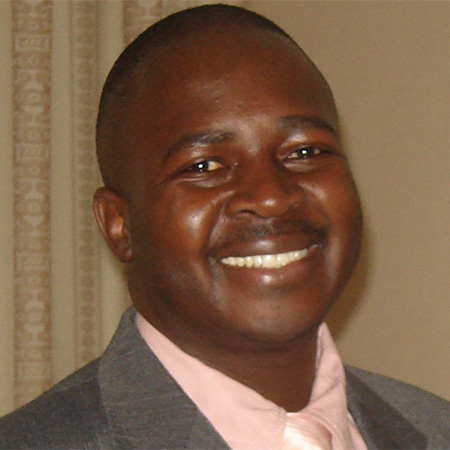
Bekithemba (Themba) Gumbo is a Civil Engineer and holds a PhD in water and sanitation. He is a national of Zimbabwe, and a permanent resident in South Africa since 2001. He was trained in Zimbabwe, England and the Netherlands.
He has more than 20 years of working experience, firstly, during the late 1980’s early 1990’s where he worked for the City of Bulawayo as a water and sewerage engineer. He joined the University of Zimbabwe as a lecturer in 1995. During his ongoing tenure in academia he has been a lecturer, visiting researcher, and external examiner at various institutions and universities in southern Africa. He has published widely in water and environmental management.
In 2004 he worked for the Training and Instructional Design Academy of South Africa (Tidasa) a consulting company based in Pretoria, South Africa. In the beginning of 2005 he joined WaterNet as a Manager, a network affiliated to Cap-Net comprising of 60 university departments, training and research institutes in 17 countries of Southern and Eastern Africa working together to build and strengthen capacity in integrated water resources management.
Before joining Cap-Net in 2011, Dr Gumbo held the position of Project Manager for a Southern Africa Development Community (SADC) regional water demand management (WDM) programme being implemented by the Development Bank of Southern Africa (DBSA).
His passion is on networking, capacity development and empowering young people to take-up a career in water and environmental engineering and management.
Ian Douglas began research at the University of Oxford and completed his Ph.D. at the Australian National University.
His first experience of the tropical hydrology and water resources was in North Queensland, Australia. He then worked in Malaysia in the nineteen sixties, returning in the mid-nineteen eighties to establish a hydrological research programme at the Danum Valley Field Centre in Sabah with which he was involved for 20 years. He was a consultant on hydrology, erosion and sedimentation to the Mekong River Commission and the Science Co-ordinator of the UK’s Natural Environment Research Council’s Lowland Catchment Research Programme that integrated hydrogeological, hydrological and freshwater ecological studies in rivers mainly fed by groundwater.
His books include Humid Landforms (1977), The Urban Environment (1983), Cities: an Environmental History (2013) and (with Philip James) Urban Ecology (2014). Now Emeritus Professor at the University of Manchester, where he was Professor of Physical geography (1979-97) after being Professor of Geography at the University of New England, Australia (1971-78).
He is proud to have had Ph.D. students who are (or have been) Professors at Universiti Malaya, Universiti Kebangsaan Malaysia, Universiti Sains Malaysia, Universiti Tekonologi Malaysia and Universiti Malaysia Sabah.
Contact the Secretariat, Alicia Lim at mycdnet.org@gmail.com for programme and registration details.
- Published in Education, Environment, Events, Past Events
Training of Trainers on Integrated Urban River Basin Management (IURBM)
The Training of Trainers on Integrated Urban River Basin Management was successfully completed on 24 April 2019 in Kuala Lumpur, Malaysia. Organised by the Malaysian Capacity Development Network for Sustainable Water Management (MyCDNet) and the River of Life Public Outreach Programme Phases 3B & 4 , this 2-day event took on a field-based approach to training by first bringing the 30 participants and facilitators on a full-day site visit on 23 April 2019 with five observation stops along the Batu River. The field study began with the first stop at Batu Dam, the upstream of Batu River. As we journeyed downstream, we saw how the urbanisation of the Sg Batu Basin through commercial, residential, industrial, recreational development, and the development of services, amenities and infrastructure that has made this river basin, the type of urban basin it is today. This real-time perspective drew on the experiences, challenges, trials, and tribulations in implementing the River of Life Public Outreach Programme today in the 21st century. The field visit ended at the confluence where Batu River joins up with Gombak River. On the second day, with all that was observed indelibly etched on their minds, the participants could better grasp the theory on the overall concept of Integrated Urban River Basin Management, could better visualise the role and challenges of the local councils, and were more inspired to do their parts in the rehabilitation of our rivers – which is one of the main objectives of the River of Life Public Outreach Programme. Links to training materials and photos: https://drive.google.com/open?id=1lo0ZbYRRvyBo5YsVWPawTptZgwwoY_Hehttps://photos.app.goo.gl/rT3mEsQgUCKGKqzZ7
- Published in Education, Environment, Events, Outreach, Past Events
MyCDNet National Forum 2019
MyCDNet National Forum 2019
Water for Sustainable Development: What’s Next
9 – 10 July 2019 | Research Management & Innovation Complex, University Malaya
Malaysian Capacity Development Network for Sustainable Water Management (MyCDNet) is pleased to announce the second Biennial National Forum 2019 on “WATER FOR SUSTAINABLE DEVELOPMENT: WHAT’S NEXT”; a theme specifically chosen to promote that water is everyone’s business when faced with an uncertain climatic future.
Malaysia had committed to support and implement the 2030 Agenda for Sustainable Development and its 17 Sustainable Development Goals (SDGs) at the United Nations Sustainable Development Summit in September 2015; resulting in the alignment of the 11th Malaysia Plan (2016 – 2020) to most of the global SDGs. Since then, Budget 2019 also announced the setting up of the Sustainable Development Financing Fund under Bank Pembangunan Malaysia Bhd, of RM1 billion, to support the Government’s efforts to implement the 17 SDGs, focussed on four (4) sectors, namely: Infrastructure, Maritime, Oil & Gas, and Technology. The question remains on how the SDGs are being achieved in the country, and what is being done in order for us to meet the ambitious 169 specific targets by Year 2030. We hope this Forum will provide a platform and an occasion for all participants and their organizations that have a stake in the water and climate change sectors, to collectively share and create an enabling environment to succeed.
FORUM THEMES
Four important themes are selected for the FORUM comprising two papers each.
Theme 1: Climate Change Actions: Water Security for a Low Carbon Economy
This sets the direction for a meaningful discourse on the concept of a low carbon economy that is yet to be fully understood by everyone, especially when responding to climate change actions in the country. The focus will be on strategic actions for “more use with less water” concepts, without compromising water availability and security for all economic sectors, as in agriculture, industries, health, water supplies and renewable energy usage, advocated in the Paris Agreement (2015) and COP24 (2018), which were actively participated by Malaysia.
Theme 2: Building Resilience: Water-wise Solutions
This theme reflects on the vital role of water-wise solutions to strengthen the resilience of social, cultural, economic and environmental systems in the country. What more can we do in future under unpredictable climatic conditions and unprecedented man-made landuse change? How do natural disasters such as floods and drought play out in building resilience? The highlight will be on any water-wise solutions already adopted that can be replicated easily throughout the country; as well as on future solutions when new ideas, technology and innovations come on-stream in the water sectors.
Theme 3: Sustainable Cities: Smart Water Management for Community Well-Being
Water is fundamental to life and smart water management is a pre-requisite for community well-being in cities and urban areas. To highlight this, the emphasis is on how to sustain good water quality and quantity for all communities; more so in urban cities where 70% of the population in Malaysia reside. What are the pragmatic measures we can adopt for effective and sustainable water management in cities – these are the significant challenges we are facing today.
Theme 4: Malaysia Achievements of Water-related SDG’s
Rapid economic growth in the country is often attributed to its ability to exploit its natural resources. In the process, there is a compromise between water resources and the environment. Considering the trend in global, regional and national development, the Malaysian Government has initiated at the New York Summit 2015 to undertake a sustainable development approach, through ratification of the water-related SDGs, especially SDG-6, relating to clean water and sanitation, aiming for water security for our future generations. How much progress have we achieved over the years, and what more can be done across all sectors of the economy in future in Malaysia? Some global and regional success case studies will be shared in the discussions.
WHO SHOULD ATTEND:
The Biennial Forum is open to all members, stakeholders, policy-makers, technical practitioners, industrial players, developers, consultants, academé and the general public who are interested in our common future on sustainable water management through wise policy and innovative technology.
FORUM REGISTRATION FEE
RM300 for MyCDNet Members
RM400 for NON-MyCDNet Members
Registration will be closed once all seats are filled.
Please submit the enclosed registration form with payment before 25 June 2019 for us to make the necessary catering & logistic arrangements.

CPD HoursPending EiMAS and BEM Approval Number
For enquiries on registration and any other matters, please contact the Secretariat:
Ms Alicia Lim
Mobile: 6012 229 0688
Office: (603) 9057 4392
Fax: (603) 9057 3943
E-mail: mycdnet.org@gmail.com
- Published in Education, Environment, Events, Health, Past Events
Advanced ToT on River Pollution Public Outreach Programme
The Malaysian Capacity Development Network for Sustainable Water Management (MyCDNet) has organized and conducted the Advanced Training of Trainers on River Pollution Public Outreach Programme on 17 – 18 October 2018 as a follow-up training workshop on the River Pollution TOT held in November 2017. The first day was held in JPS Ampang, Kuala Lumpur, followed by the second day in the Klang River Outdoor Classroom.
This Advanced TOT was carried out in collaboration with Global Environment Centre (GEC) and Asia Pacific Environmental Consultants (ASPEC), with support from Cap-Net UNDP to capacity build water professionals, capacity builders, local authorities’ and others to safeguard the sustainability of the public outreach programmes to monitor and prevent river pollution through effective stakeholder engagement.
The first full day covered the basic information followed by case studies, lessons learnt, crises and mitigation, legislations, current technology and practices, and effective stakeholder engagement and management. Presentations by lead trainer Dr Kalithasan Kailasam and speakers from Department of Environment (DOE), Lembaga Urus Air Selangor (LUAS), Department of Irrigation & Drainage Malaysia, Local Agenda 21 Kuala Lumpur, and KUB-Berjaya Enviro were in-depth and enlightening. The day ended with some lively role-playing facilitated by Mr James Warren, Head of Section of Indah Water Training Centre.

On the second day, participants had the opportunity to get down to the pristine upstream of Klang River and received hands-on training at the Open Classroom to measure the quality of the river through physical, chemical and biological monitoring, as well as to learn the nature of a river to better appreciate it. It was followed by pollution mapping and mitigation as participants adjourned 1km downstream to the commercial and polluted parts of Klang River.
All participants gave positive feedback and especially enjoyed the outdoor learning. Some even requested for a 3-day instead of a 2-day course.
According to the DOE Environmental Report published in yearly basis, the main sources of organic water pollution are domestic and industrial sewage, effluents from agro-industries and animal husbandry. In urban and industrial areas, organic pollution of water from both point and non-point sources have resulted in environmental problems and adversely affect riverine biodiversity. Rivers which pass through urban and human settlements suffer the worst degradation and are subjected to heavy solid and liquid waste disposal from squatter settlements, drainage effluents from commercial and housing areas, food centers, wet markets, and silt loads from land clearing. Rivers need to be managed in an integrated and holistic manner involving all major stakeholders who have interest and benefits from better-managed rivers. The widespread adoption of sustainable water management requires large-scale attitude and behavioural change. The role of effective facilitators who can engage with a broad audience, translate information into meaningful terms, build real interest and a commitment to action, is powerful and effective to effect change and these were emphasized under the Advanced ToT on River Pollution Public Outreach Programme.
More photos can be viewed at https://photos.app.goo.gl/Aj1q5n5j5nRDDSys6
The full lecture slides are linked here https://drive.google.com/open?id=1QC-OmMPzYDdoBdHkFQmzwG26To3FFN3x
- Published in Education, Environment, Events, Outreach, Past Events, Stakeholder Engagement
ToT Course on Water Safety Plan 3-4 July 2018
The Malaysian Capacity Development Network for Sustainable Water Management (MyCDNet) has organized and conducted the first in a series of courses for Water Safety Plan (WSP) on 3 – 4 July 2018, held at the Indah Water Training Centre Kuala Lumpur, Malaysia, for 30 participants who were mainly from water agencies nationwide.
This WSP Course was carried out in collaboration with Specialists from the Malaysian Water Association (MWA), Universiti Malaya, Akademi Sains Malaysia and Asia Pacific Environmental Consultants (ASPEC), with support from Cap-Net UNDP.
This first WSP Introductory Course, which consists of the first five modules in a series of 15 modules in the Water Safety Plan Course, was specifically designed to assist water-related agencies and water operators to start developing their WSPs if they have not done so, or to assist those that are reviewing their WSP. Two other instalments of the WSP Course of five modules each will be rolled out by MyCDNet in the next two years.
The Deputy Network Manager for MyCDNet Tuan Haji Md Khairi Selamat opened the TOT Course on Water Safety Plan with welcoming remarks and an introduction of MyCDNet and the Course. It was an intensive two-day course covering 5 modules and 3 exercises leading to the development of a WSP by each of the 3 groups of participants. At the end of the Course, each group presented their WSP and the winning group received souvenirs from MyCDNet. The presentations were judged by MyCDNet Network Manager Dato’ Ir Lim Chow Hock and Advisor Datin Zaharah Hj Mahmud based on the WSP development criteria in Modules 1 – 5.
Module 1: What is WSP? and Module 2: Roles, Responsibilities and Legal Aspects were presented by Dr Low Kwai Sim, FASc, Advisor to MyCDNet who was certified by The Water Institute in the University of North Carolina upon completing the 10-week course on Water Safety Plans.
Module 3: Team Development in WSP was presented by Mr Mansor Abd Ghani, a water specialist from the Malaysian Water Association with vast experience in water supply and resource management and training. Dr Low continued with Module 4: Development of WSP with a segment on Water Quality and Public Health Implications Along the WSP Chain presented by Prof. Dr Victor Hoe from the Medical Faculty of University of Malaya. Lastly, Mr Mansor presented Module 5: Understanding the Hazards and Risks before the participants were given time to complete the WSP in their groups.
Participants were given ample time to do the exercises and were encouraged to ask questions and give feedbacks throughout the lectures, which made for a lively and interactive Course. Some constructive comments were noted to improve on related courses in the future. The overall positive feedbacks showed that future follow-up courses on WSP would be well attended.
At the end of the Course, Dato’ Ir Lim Chow Hock presented the souvenirs to the group members with the winning WSP and closed with a speech that highlighted the nation’s need for proper WSPs to be in place.
Water Safety Plan (WSP) is a systematic approach to address the provisions of good, safe and consumable water from water source to consumption. The value of WSP has been repeatedly highlighted as crucial for all countries of the world to adopt in order to provide safe and clean water for all in the latest revisions of the World Health Organisation (WHO) Guidelines for Drinking-Water Quality (GDWQ) (2017).
To design and produce a WSP, a thorough scientific and technological assessment of the water supply process from water source to the consumer’s tap must be carried out by the water-related agencies and water operators. Related to this, are the hazards and risks, sanitation and hygiene, all of which must also be identified in tandem with minimizing the risks at every step in the water supply chain.
Every water-related agency and operator has a duty to provide the most effective means of maintaining a safe and sustainable water supply for all aspects of human consumption that includes drinking as well as other forms of water contact that meet the regulatory water standards and basic human health.
- Published in Education, Environment, Events, Past Events
National Forum 2017 “Wastewater as a Resource: Opportunities & Capacity Development”
Following the success of the first national forum organized by MyCDNet in 2016, the National Forum 2017, with the theme Wastewater as a Resource: Opportunities & Capacity Development, saw a greater turnout totalling 123 participants from government agencies, the private sector and institutions of higher learning.
The National Forum 2017 was officially opened by the Honorable Dato’ Dr. Tan Yew Chong, Deputy Secretary General of the Ministry of Energy, Green Technology & Water (KeTTHA), on 24 October 2017 in Kelab Golf Perkhidmatan Awam (KGPA). On 25 October 2017 there was a half-day technical site visit to Pantai 2 Sewage Treatment Plant – an underground facility with a beautiful sprawling ecopark above it.
There were four keynote speeches and ample time for the Q & A sessions. The first session was chaired by Dato’ Ir. Haji Nor Hisham bin Mohd Ghazali, Director of Water Resources and Hydrology Division, Department of Irrigation & Drainage Malaysia (DID). The keynote topics were Wastewater Management and Policy in Malaysia by Mr. Muhammad Rosli Bin Muhammad Jaafar, Undersecretary Sewerage Services Industry Division, KeTTHA, and Biological Wastewater Treatment Technology by Assoc. Prof. Dr. Ma’an Fahmi Rashid Al-Khatib of the Department of Biotechnology Engineering, International Islamic University of Malaysia (IIUM).
The second session was chaired by Mr. Mohd Ridhuan bin Ismail, Chief Executive Officer of Suruhanjaya Perkhidmatan Air Negara (SPAN). The keynote topics were Leachate Treatment in Landfills in Malaysia by Mr. Ng Weng Mun, Senior Manager of SWM Environment Sdn Bhd, and Capacity Development in Water and Wastewater by Mr. Jan T.L. Yap, Chairman of AguaJaring.
Before the close of the first day, all who were present witnessed the handing over of Aguajaring’s Chairmanship by Mr Jan T.L. Yap from Indonesia to Dr Rodora H. Gamboa from Philippines, after a brief introduction about Cap-Net, AquaJaring, MyCDNet, Phil Cap-Net and CK-net by Dr. Low Kwai SIm, Advisor to MyCDNet and Aguajaring.
The site visit to Pantai 2 Sewage Treatment Plant on Day 2 was a first for many participants, especially those from out of state, as the facility is relatively new. It was an informative and memorable half-day out. Heartfelt thanks to Indah Water Konsortium Sdn Bhd (IWK) for organizing and facilitating the visit.
MyCDNet thanks the Honourable Dato’ Dr. Tan Yew Chong, hosts, sponsors, facilitators, speakers, participants, and co-organizers – KeTTHA, DID, SPAN, IWK, Global Environment Centre, Asia Pacific Environmental Consultants Sdn Bhd, Malaysian Water Association – for their time, energy and support in making this Forum a success. Here’s to more and better trainings and activities.
Speakers’ slides and more photos can be viewed at https://drive.google.com/open?id=0B8R9OBjm4m3vdTBza3QyVWlyWWs
- Published in Education, Environment, Events, Past Events
- 1
- 2


